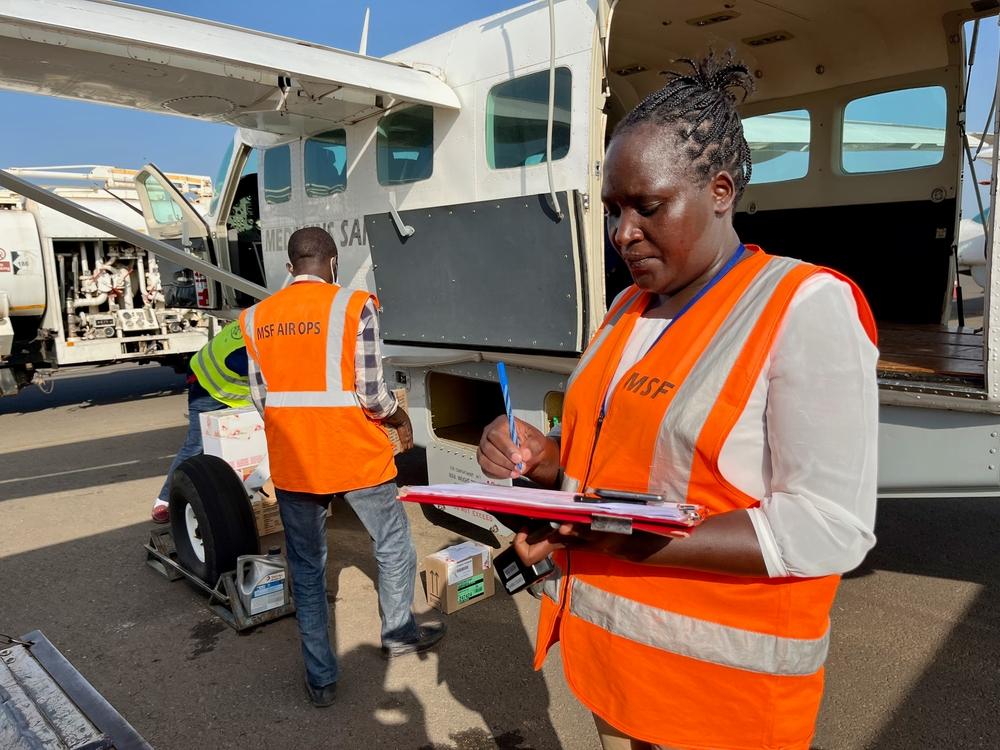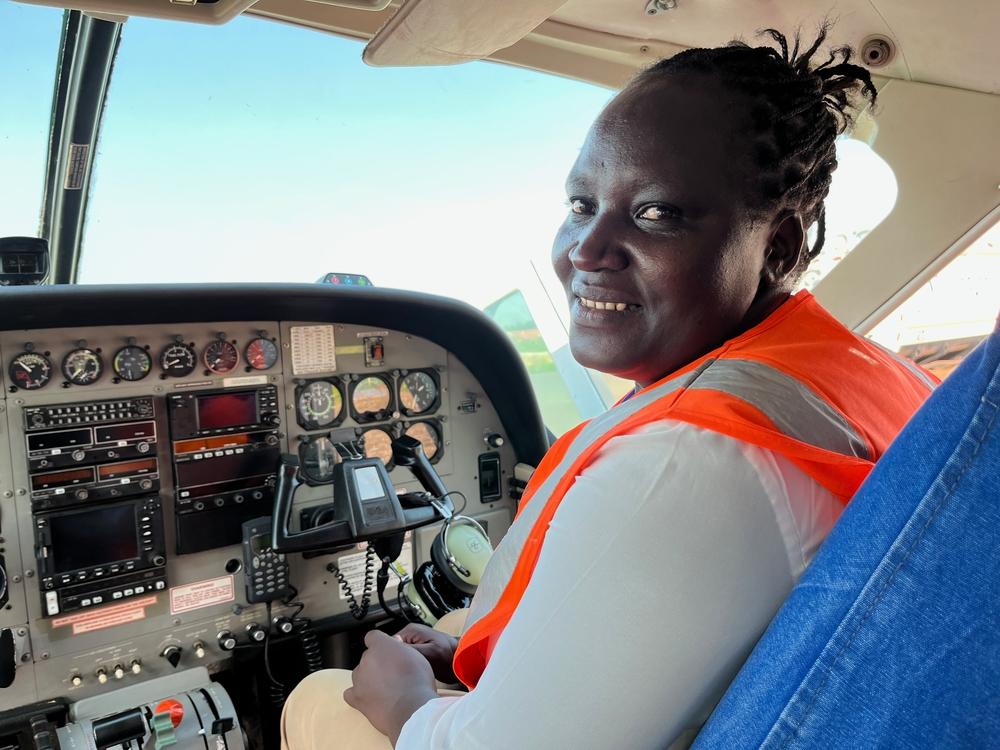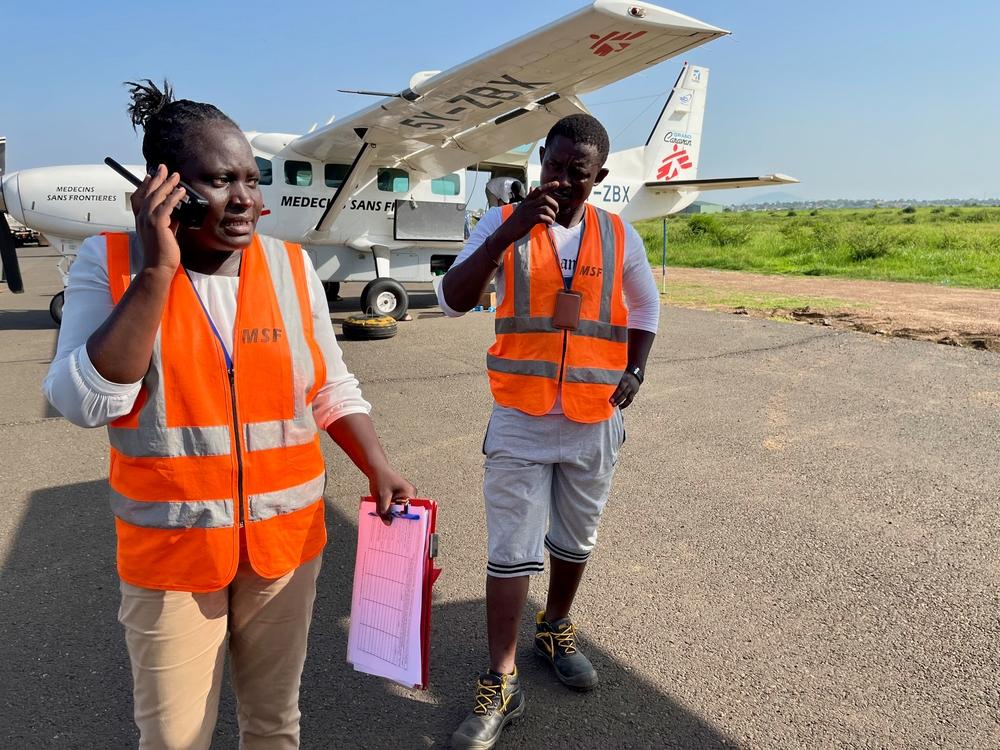My life as a female flight coordinator

Deputy Flight Coordinator Stella Mwikali at the airport in Juba during a pre-flight briefing. South Sudan, 2022. © Verity Kowal/MSF
Many of the areas where Doctors Without Borders / Médecins Sans Frontières (MSF) works are barely accessible by road. The rainy season can bring treacherous mud that cars sink into, insecurity can make it too dangerous to drive. But life-saving supplies still need to reach our hospitals and clinics, and critically ill patients need to be transferred to specialist care. That’s where people like Stella come in…
Some moments with patients will forever linger in my mind.
Last year we got a call from the team in Malakal, a town in a remote area in South Sudan. There was a pregnant woman who had an obstructed labour – a medical emergency.
She needed a caesarean section to save her life and her baby’s. That meant an urgent transfer to the Doctors Without Borders hospital in Agok, in Abyei Special Administrative Area – over 300 km away.
We arranged the flight.
Later, we coordinated another flight, to bring her and her new baby safely home.
Charting my own path
I’m a deputy flight coordinator for Doctors Without Borders. Flight coordination involves creating flight itineraries, serving as a dispatcher, and many different aspects of flight logistics.
I’ve always been interested in planes. When I was a child I would look up at the sky in awe. But my parents had different ideas. I’m from Kenya, and my dad wanted me to go into wildlife conservation, while my mum wanted me to be a banker. But eventually they changed their minds. My dad told me that he would support my career of choice if that meant my happiness.
So I trained in aviation, specialising in operations and dispatch, plus aviation safety and quality.

South Sudan, 2022. © Verity Kowal/MSF
My journey to Doctors Without Borders
I was working with a local aviation company in Nairobi when first got a request from Doctors Without Borders. They needed a plane to carry medical supplies. I started getting more Doctors Without Borders requests. Later I found out that Doctors Without Borders also has its own planes. It got me thinking…
I wanted to work for an organisation which tries to make people’s lives better. I saw people working in different organisations who would put a smile on people’s faces – like my sister, who volunteered for a local group that raised funds to help pay children’s school fees.
In 2019, I applied to work with Doctors Without Borders, and in June that year I joined the team! So far, I’ve done four assignments as a flight coordinator in South Sudan as well as Goma in the Democratic Republic of Congo.
Essential
In South Sudan, our teams are providing lifesaving medical care. This means responding to disease outbreaks; doing vaccination campaigns; running specialist services for mothers and children; and taking health care out into the community.
Planes are essential for all of these activities. Road transportation is limited here because of poor infrastructure, insecurity, and seasonal floods. Right now I’m working in Old Fangak, a river town where there are no roads or cars, only boats and the airstrip.
In addition to transferring patients, our planes ensure that doctors and essential medical and relief supplies can get to people in need.

South Sudan, 2022. © Verity Kowal/MSF
Emergency response
One example I won’t forget was in February 2021, when floods in Jonglei and Unity States forced people out of their homes. Many had nothing: not even the basic essential items for living, so Doctors Without Borders arranged flights with relief items, including tents and blankets, as well as medical care.
Violent clashes are a perennial issue in some areas of the country, and can lead to multiple people injured and in urgent need of medical care at once. I play an important role in these circumstances. During clashes earlier this year in Agok I was tasked with transferring patients to other Doctors Without Borders hospitals as well as facilitating evacuations of Doctors Without Borders staff members.
Challenges
Despite the contentment that flight coordination gives me, South Sudan is a challenging context and the aviation standards are low. Airstrips in the region are surrounded by bushes and the air traffic control isn’t at its best.
Special moments
Despite the challenges, my job gives me many moments I will never forget. Once I had to get a little boy back to his family after a whole month away in hospital. I remember how elated they were. Seeing the joy on his family’s faces and those of others we serve, is what keeps me going.
Stella joins Doctors Without Borders as a Deputy Flight Coordinator in South Sudan.